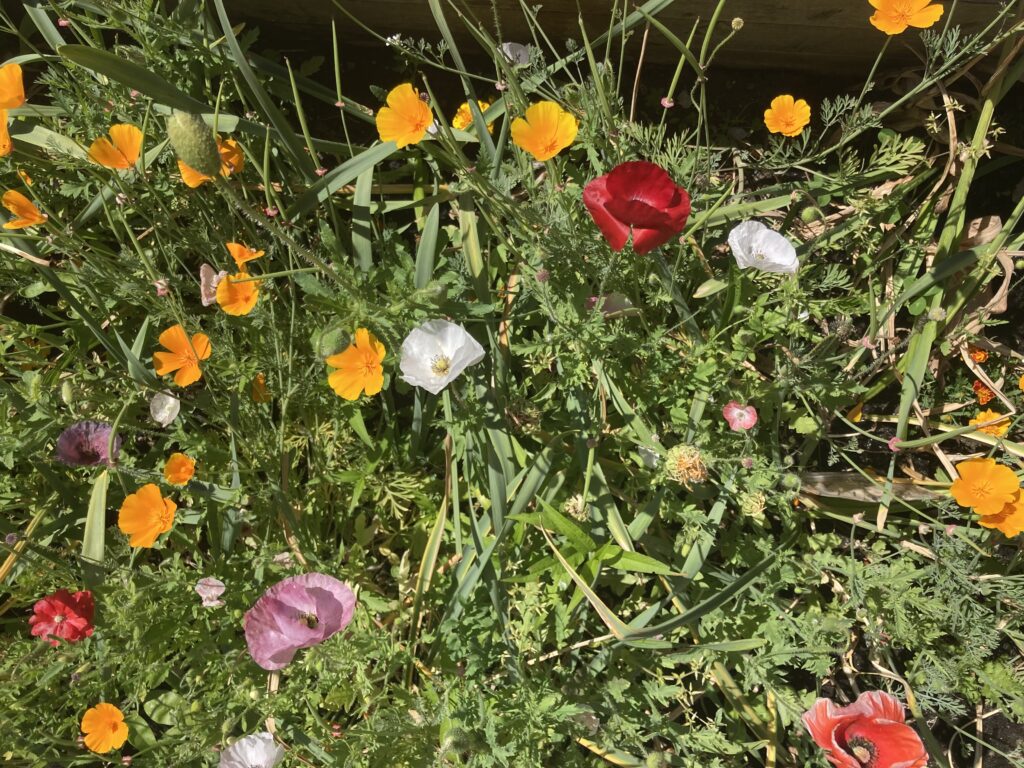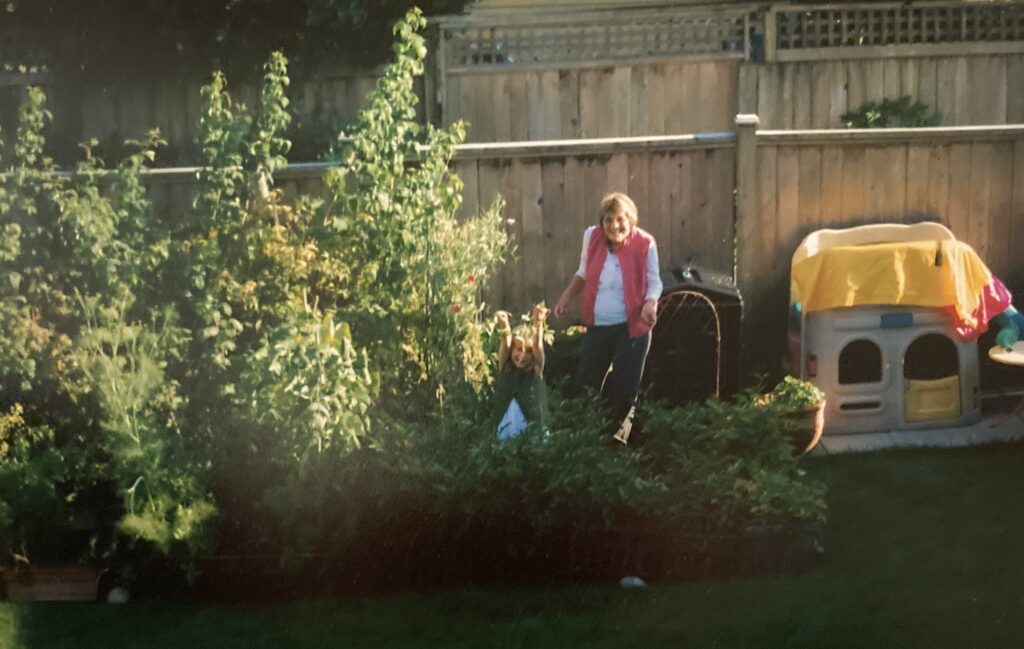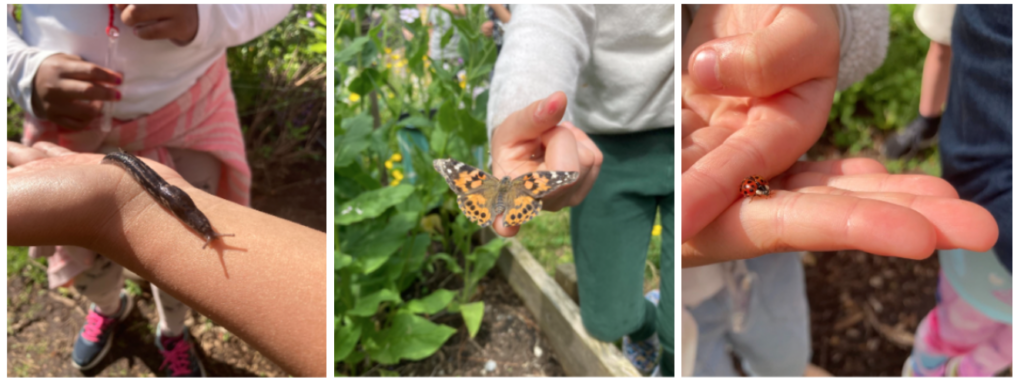Written by Annie McLeod, School Gardens Program Assistant
“We may think we are nurturing our garden, but of course it’s our garden that is really nurturing us.” – Jenny Uglow (British Historian and Garden Advocate.

MY CHILDHOOD IN THE GARDEN
I grew up in the garden. My favourite memories, songs, words and stories made their home in my family’s vegetable garden. The garden saw me through the many seasons and storms of my life: it was where I hid to avoid my first day of Kindergarten, where I spent summers sneaking raspberries straight from the bush, and where I learned never again to disturb a wasp at work.
Although I’m a relatively shy person, I become energized and impassioned in conversations about gardening. As a child, I would beg my mum to take me to the nursery. While other customers browsed the aisles, I would rush up to them and enthusiastically recommend the plants that I thought were best suited for their gardens. Even now, I jump at the chance to point out a plant or explain an environmental phenomenon to a curious friend or family member.

Throughout my life, the garden has acted as a companion, providing comfort and solace during times of need. It’s an escape after a stressful day at school, a retreat during busy exam schedules, and a place that offered refuge during the early months of the pandemic. Over the last four months, the garden has taken on a new role in my life: a workplace.
Since May, I’ve had the pleasure of working with SPEC as the School Gardens Program Assistant. Helping to support garden lessons and tending to the school gardens has offered me the time and space to reflect on the many ways that gardening has impacted my life.
THE OUTDOOR CLASSROOM
Working in an outdoor classroom, I have observed many similarities between my experiences in the garden and those of the students we teach. During garden lessons, I’ve witnessed the students become more self-confident, reflective, patient and compassionate. This has highlighted the important role that outdoor learning can have in enhancing children’s development outside of the traditional classroom setting.

In the outdoor classroom, students experience learning in an open environment. They see, feel, hear and experience what they are learning about first-hand and study the themes and subjects at their own pace. In my experience, this style of learning and the opportunities for exploration it offers have helped me to develop confidence and a stronger sense of self.
SOWING CARROTS AND BUILDING CONFIDENCE
While taking care of the gardens this summer, I’ve had consistent difficulties in sowing one particular vegetable: carrots. Each time I returned to the gardens, expecting to see a neat row of vibrant green carrot seedlings, I was met with bare soil. I tried a second sowing (hopeful that the germination troubles were just related to the hot weather); when that didn’t work, I tried planting more densely, in hopes that increasing the number of seeds would lead to greater success. When just a handful of seedlings emerged from the hundreds I had sowed, I was frustrated. I decided, rather than giving up growing carrots altogether, I would adjust my approach.
Carrot seeds are tricky. They require constant light and moisture for germination. Instead of watering in the seeds, I moistened the soil before planting to prevent them from being buried. Finally, after a few weeks I had success. I persevered through the frustration, unafraid to make more mistakes as I experimented with different methods. I emerged from the experience with new knowledge and a greater sense of confidence in my gardening abilities.
I hadn’t reflected on the impacts that the garden had had on my confidence and self-esteem until I observed the students exhibiting similar traits during the garden lessons. Confidence appeared through the children’s willingness to raise their hands and ask questions, through their enthusiasm when sharing observations with their peers, and during scavenger hunts when they would eagerly show off what they had found.
I recall a very quiet grade one student, asking for help to find aphids during the insect lesson at Riley Park Community Garden. After I pointed out a cluster on a yarrow plant, he eagerly called over his classmate. With pride and excitement in his voice, I watched as he clearly described the aphids and explained the damage they were causing to the plant. His classmate, impressed, exclaimed, “Wow, cool!” and the student beamed back at me.
Our self-led explorations of the garden allowed the children to take charge of their learning and share what they found most interesting when it came time to discuss their observations. Giving the students more control over what they were learning improved engagement in the sessions, and helped them to discover their own strengths and weaknesses through these formative experiences.
REFLECTIONS
Through my own experiences and through observing the students, I have learned about the immense value that outdoor learning can have. For me, the garden provided a safe space to inquire, explore, test boundaries, ask questions and make mistakes. Altogether, these qualities helped me to gain confidence and led to more memorable educational experiences and personalized learning outcomes. Reflecting on the lessons I’ve learned in the garden this summer, I am reminded to seize the confidence that the garden has helped me to cultivate and to seek out more opportunities to learn, explore and reflect.
The SPEC School Gardens Program offers interactive, garden lessons for school-aged children centred on Ecological Literacy and organic gardening. For more information, access the School Gardens Program page.